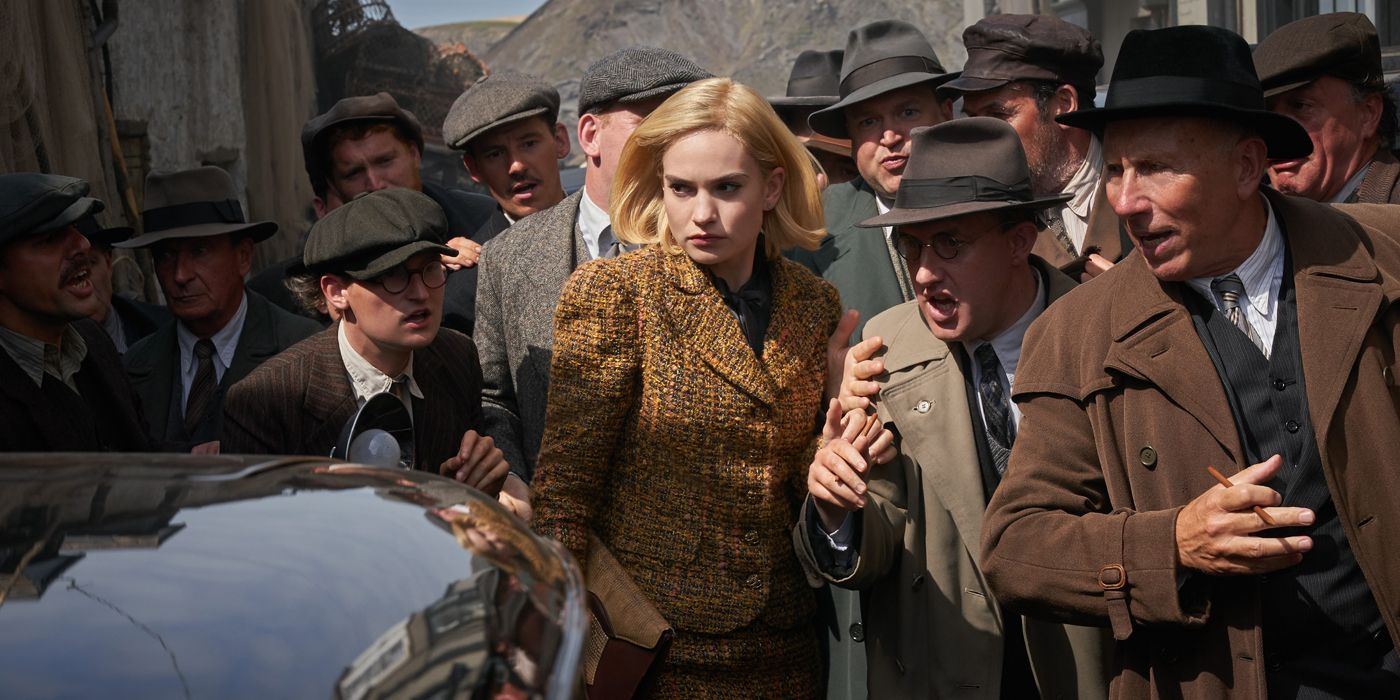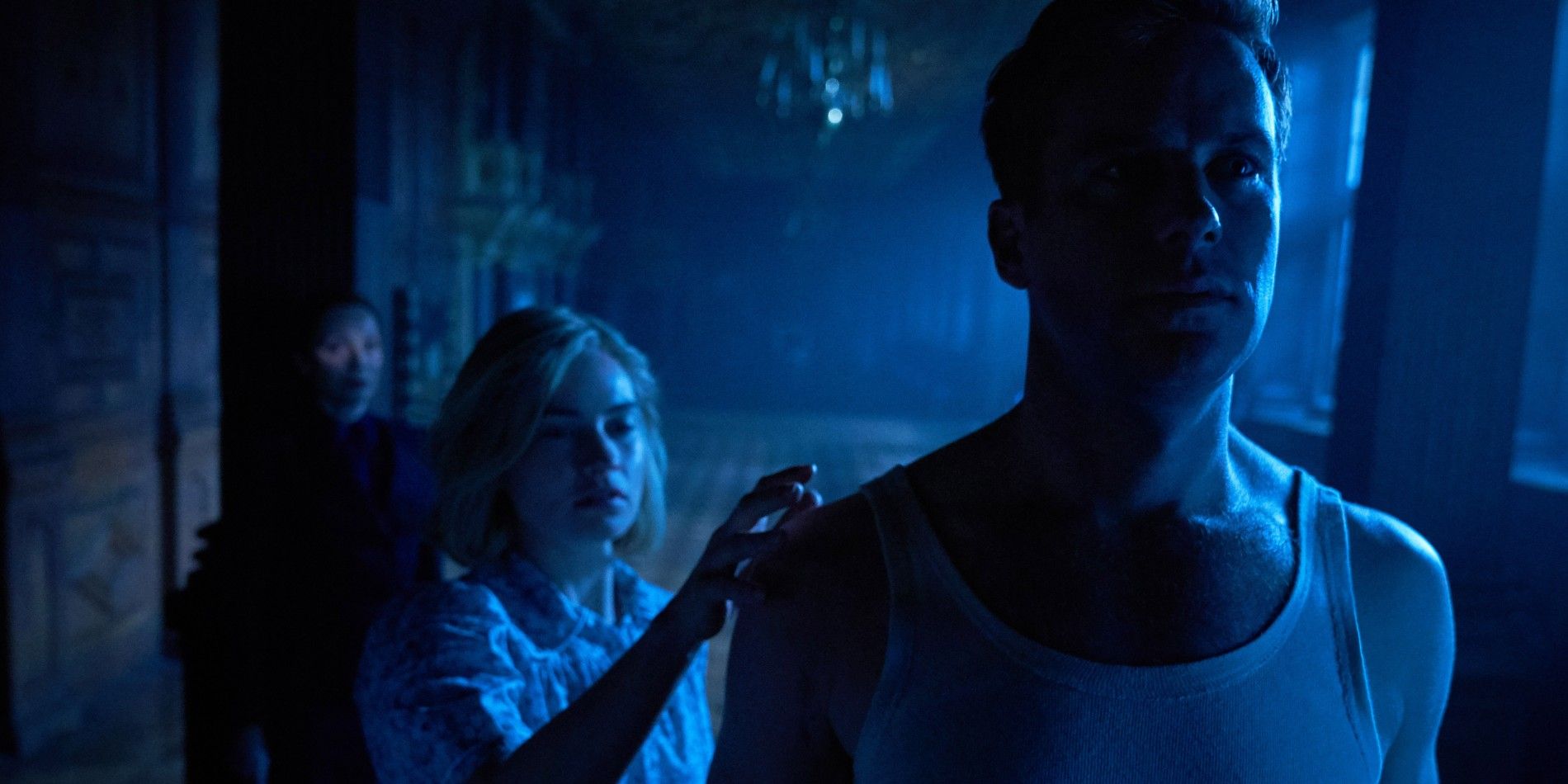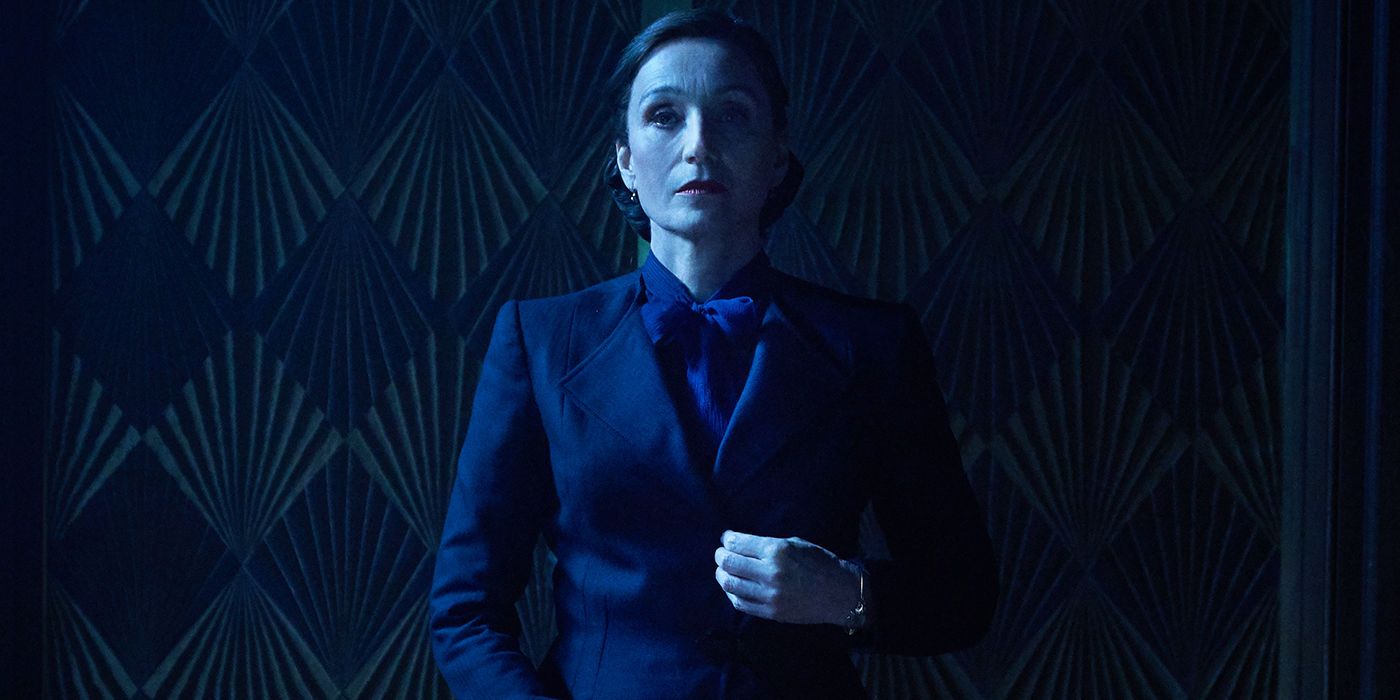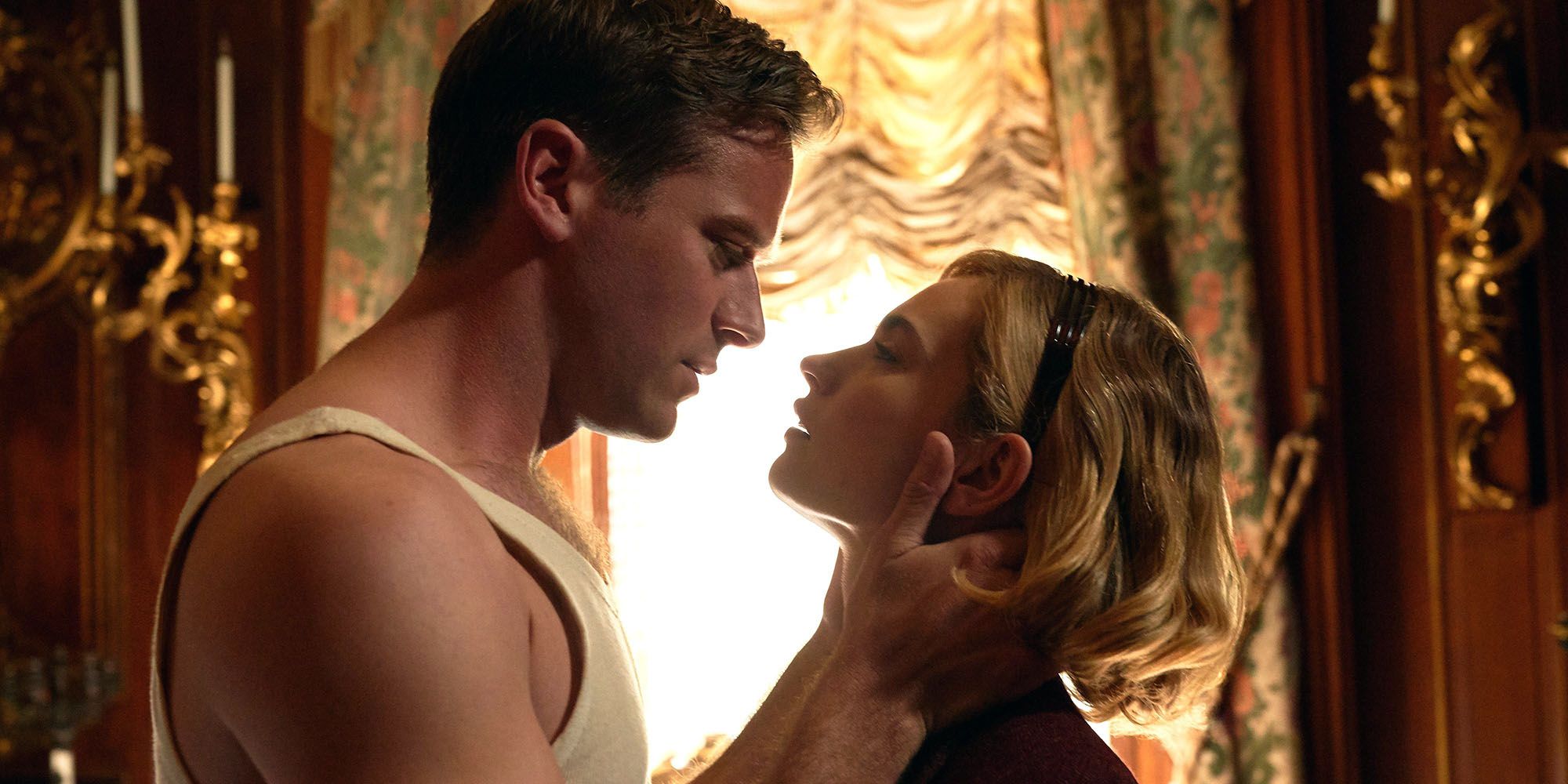Ben Wheatley's new adaptation of Daphne du Maurier's acclaimed novel Rebecca has an ending that differs considerably from the original story - though it stays true to the circumstances of Rebecca de Winter's death. Released on Netflix, Rebecca stars Lily James as an unnamed protagonist who marries the wealthy heir Maxim de Winter (Armie Hammer) during a whirlwind romance in Europe. After returning to Maxim's stately home, Manderley, she finds herself haunted by the memory of his first wife, Rebecca, who drowned in a boating accident.
Keeping Rebecca's memory alive at Manderley is the intimidating, black-clad housekeeper Mrs. Danvers (Kristin Scott Thomas), who cared for Rebecca ever since she was a girl and remains fiercely, obsessively devoted to her. Seeing the second Mrs. de Winter as being an insult to the memory of her beloved Rebecca, and certainly not worthy to take her place at Manderley, Mrs. Danvers seeks to sabotage the new lady of the house and her relationship with Maxim.
Rebecca has been adapted many times before, mostly famously by Alfred Hitchcock in a 1940 film starring Laurence Olivier as Maxim and Joan Fontaine as the second Mrs. de Winter. However, Wheatley's film has a slightly different ending to Hitchcock's, particularly when it answers the question of how Rebecca really died.
How (& Why) Rebecca De Winter Died
As Mrs. de Winter learns from the file in the doctor's office, what Jack Favell (Sam Riley) believed - and Rebecca claimed in her confrontation with Maxim - was an illegitimate pregnancy was actually an advanced cancerous growth in her uterus. With only weeks left to live, Rebecca was not only facing the prospect of her death being slow and agonizing, but also degrading; she was renowned for her beauty and poise, and would hate for the lasting image of her to be a woman wracked with sickness and pain. However, self-inflicted suicide was not an option. Rebecca knew that if she killed herself or passed away from cancer then Maxim would "win" by finally being freed from her without having to feel any guilt over her death. Instead she decided to claim a final victory by using an imaginary pregnancy to taunt and provoke him into killing her, so that he would go to prison for her murder. This is what Maxim feared when he told his second wife that Rebecca had won after all.
Rebecca paints a portrait of Maxim de Winter as the victim of long-term emotional abuse, who was trapped in a marriage that was daily torment for him, but seemed perfect from the outside. Just a few days after they were married, Rebecca lifted the veil and outright told him that she had never loved him, and that she intended to maintain her flat in London and keep a string of lovers despite their marriage. "I hated her," he tells his new bride. "Hated her cruelty. I hated my cowardice. Knowing that I wouldn't divorce her. Knowing I could never do that to our name." Earlier in the film, Maxim speaks about his love of Manderley and the pressure he feels to uphold his family name (his sister's sons, who are in line to inherit the house if Maxim doesn't have an heir, are described as fine young men but "not de Winters").
This powerful principle of inheritance and legacy that drives Maxim was the key to him killing Rebecca. "It wasn't enough for her to take my pride," he says. "She wanted to take my name, my home, everything." Knowing that Maxim would rather stay the rest of his life in a miserable marriage than disgrace his family name with a divorce, Rebecca surmised that the thing that could push him over the edge into murder was threatening to make the illegitimate son of herself and her cousin, Jack Favell, the heir to Manderley. Between this threat and the promise that pulling the trigger would set him free, she successfully goaded Maxim into assisting in her suicide and, so she believed, sealing his own doom.
How Maxim Got Away With Murder
In an effort to save himself, Maxim put the body in the cabin of Rebecca's boat, scuttled it badly enough to make it sink, and pushed it out to sea. When the body of a different, unknown woman washed up in Edgecombe two months later, he identified it as Rebecca, hoping that it would put an end to everything. After the costume ball, however, a tanker running aground leads to the discovery of Rebecca's boat and the real corpse inside. The evidence of holes punched in the bottom of the boat from the inside makes it clear that Rebecca's death was no accident, and Maxim is arrested after Jack Favell reveals a note from Rebecca, inviting Favell to Manderley so she could tell him some important news, which suggests that she wasn't planning to kill herself. The note doesn't incriminate Maxim, but his attempt to pay Favell off does.
Since the note is what puts the suspicion on Maxim, the reveal of exactly what news she had is the key to his release. At first it's believed that Rebecca was pregnant, but when the doctor makes clear the advanced state of her cancer and the fact that she only had a few very painful weeks left to live, suicide is believed to be the likeliest cause of death once again. Maxim is off the hook for any criminal charges, but Rebecca's most faithful companion makes sure that he and Mrs. de Winter's victory isn't a clean one.
Why Mrs. Danvers Burns Down Manderley
Throughout Rebecca, Mrs. Danvers effectively acts as the proxy for Rebecca's vengeful spirit. She was Rebecca's personal maid and came to Manderley with her following Rebecca's marriage, making Mrs. Danvers loyal to the first Mrs. de Winter rather than to Maxim. As far as Mrs. Danvers is concerned, Manderley belongs to Rebecca, not to Maxim or to his new wife. Mrs. Danvers' deep love and respect for Rebecca, her insistence on keeping her memory alive, and her jealous hostility towards the second Mrs. de Winter imply that there may have been a romantic element to her relationship with Rebecca, and Wheatley's adaptation leans into this with Mrs. Danvers' final farewell before she jumps into the ocean.
"He killed the only person I loved," she tells Mrs. de Winter after burning down the mansion. "I can't let you have Manderley. It was ours, you see." Like Rebecca, Mrs. Danvers had already resolved to die, but she couldn't bear the thought of Maxim being happy with his new wife in Manderley after her death. In a final tribute to Rebecca, she too attempted to destroy Maxim's life as a parting gift. Her warning to Mrs. de Winter that she'll never be truly happy could be interpreted as either a curse, or as what Mrs. Danvers genuinely believes.
How Rebecca's Ending Is Different In The Book & Hitchcock Film
The ending of Wheatley's Rebecca is both more and less faithful to Du Maurier's novel than Hitchcock's adaptation, in different respects. The story of how Rebecca de Winter died - shot by Maxim before being pushed out to sea as a cover-up for the murder - was changed for Hitchcock's film due to the Hays Code. Formally known as the Motion Picture Production Code, the Hays Code was a set of moral guidelines enforced in Hollywood between 1934 and 1968, which among many other rules prevented films from showing interracial or same-sex romances (though Hitchcock managed to sneak some lesbian subtext into Rebecca under the radar).
Under the Hays Code, the murder of a woman by her husband could not have been shown in any kind of positive light, and the script would have required Maxim to either be killed or go to prison for the murder (to impress upon audiences the lesson that crime does not go unpunished). To get around this, the circumstances of Rebecca's death were changed in Hitchcock's film so that instead of Maxim killing his first wife, she trips over in the boathouse during their confrontation and dies when she hits her head. Afraid that he will be blamed, Maxim covers up her death by putting her in the boat and scuttling it - but technically he is innocent of her murder.
Wheatley's Rebecca departs from both the novel and the 1940 film by having Maxim succumb to Mr. Favell's blackmail and write him a check for £10,000, which is then used against him in court as evidence of his guilt. In the original story Maxim calls Favell's bluff and actually phones the local chief of police himself, inviting him over to hear what Favell has to say and to look at the note from Rebecca. This strategy fortunately pays off when the doctor in London offers testimony that provides a plausible motive for Rebecca committing suicide (James's character breaking into the doctor's office to look at the file before the police was an addition for Wheatley's film). The second Mrs. de Winter firing Mrs. Danvers also doesn't happen in the original novel or Hitchcock's film. The book instead ends with the de Winters driving towards Manderley as it burns, and in the 1940 adaptation Mrs. Danvers remains in Rebecca's old room as the house collapses, until she's killed by burning timbers falling in on her.
The Real Meaning of Rebecca's Ending
The function of Rebecca's final act is to turn everything that Mrs. de Winter thinks she knows on its head. She believes that Max is pining for the only wife he ever really loved, and constantly comparing her unfavorably to Rebecca. She believes that Rebecca was a perfect woman and a perfect wife who tragically drowned and left her husband inconsolable. Instead it's revealed that not only was Rebecca enormously cruel, and that Maxim hated her, but even Rebecca's death was a final means of inflicting harm on her husband. Maxim loves the second Mrs. de Winter because she's the antithesis of everything his first wife was; she's sweet, modest, innocent, and has no real interest in being the lady of Manderley - only in being Maxim's wife. Still, by the end of the film Maxim laments that his and Rebecca's dark past has robbed his new wife of the innocence that he initially fell in love with.
The enduring power of Rebecca is in how it constructs a villain out of a person who is never actually seen (though there are fleeting glimpses of her in Wheatley's film). It's effectively a ghost story without a ghost; instead of literally haunting the second Mrs. de Winter, Rebecca remains in the house through monogrammed fabrics, letters, rules about the way she liked things done, the powerful impression she left on everyone who met her and - of course - through the spectre of Mrs. Danvers. Manderley being burned to the ground and Mrs. Danvers dying are the story's way of exorcising Rebecca's ghost, though she still returns to haunt the second Mrs. de Winter in her dreams.
Rebecca is one of the most influential gothic romances ever written. There are strong shades of it in David Fincher's 2014 thriller Gone Girl, which has a similar twist regarding the wife who seems to have met a tragic fate, and in Guillermo del Toro's supernatural horror film Crimson Peak, which is about a young bride who finds herself being tormented within the walls of her new husband's ancestral home. Though the story remains mostly the same, the lasting impact of Rebecca's ending often depends on where exactly adaptations choose to end. Ben Wheatley's Rebecca doesn't end with the novel's final image of Manderley on fire, but with a shot of the second Mrs. de Winter embracing Maxim in a hotel room, looking over his shoulder directly into the camera. It's a moment that can be read as a final declaration of victory over Rebecca, with love having saved the couple in the end.










